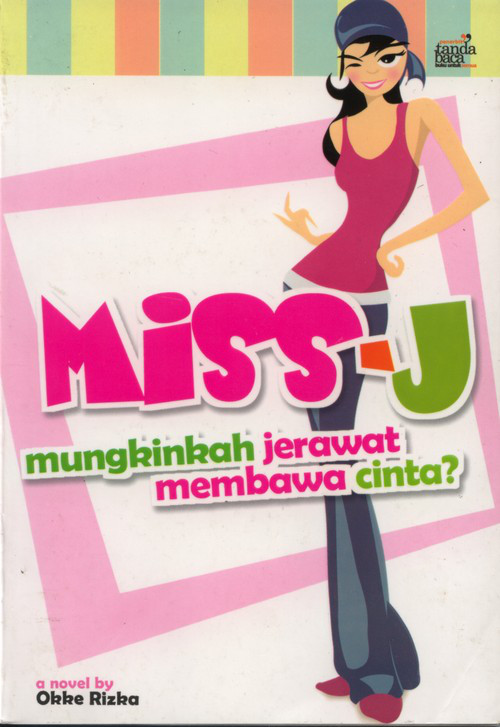Since the weather here in Sydney, Australia can be described as somewhere between “wow, I didn’t know my sandals could melt like that” and “oh my god, I’m on the surface of the sun,” I’ve spent most of the weekend lounging in front of the air conditioner and getting some reading off my backlog.
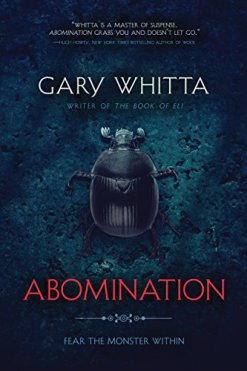 Abomination by Gary Whitta is actually something that I’ve had on my kindle for over a year now but kept letting it slip off my radar as new books would come out, which I now regret. It’s a very good book and not for the reasons I went in expecting it to be. All of the blurbs talk about it melding together cosmic horror with historical combat, but truly I found it to have more in common with a really good lycanthrope story than anything else.
Abomination by Gary Whitta is actually something that I’ve had on my kindle for over a year now but kept letting it slip off my radar as new books would come out, which I now regret. It’s a very good book and not for the reasons I went in expecting it to be. All of the blurbs talk about it melding together cosmic horror with historical combat, but truly I found it to have more in common with a really good lycanthrope story than anything else.
Just a lycanthrope story featuring things like knights templar, monstrous scarab beetles, and conflict between the Saxons and the leftovers of the Great Heathen Army in the 800s or thereabouts, featuring cameos by a variety of historical figures. Admittedly you are not going to find a lot of historical accuracy in those figures or in the years, but given that this book literally opens up with corrupted vatican officials using eldritch scrolls to transform animals into unstoppable berserk monsters, you kind of go in knowing it’s going to be pulpy alternate history. The fun comes from taking figures like Alfred the Great and trying to guess at what their reaction would be to the borderline apocalyptic events of the novel.
As far as negatives go, it has to be said that the characters are fairly stock with one or two exceptions, and you know how the PoV characters are going to react to anything well before they do. The honorable knight is going to be honorable, the tomboy girl who wants to join the elite monster hunting corps will act like a 90s movie action girl after being sexually threatened by some roving antagonists. But around that core there’s a fascinating story woven and I found the logistics of the… well, supernatural aspects, I guess, fairly compelling and page-turning. It’s a horror novel but most of the chapters are devoted to how to keep that horror contained using medieval tools and education, a combination I haven’t run into before.
It’s under a dollar this month so I’d definitely recommend picking it up if any of this interested you.
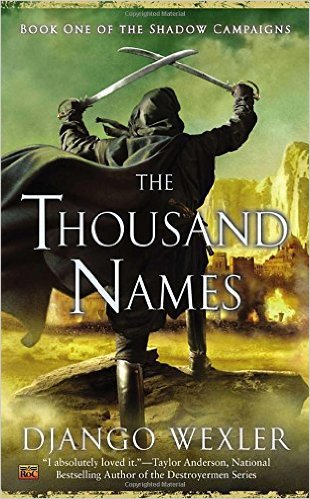 Next, I finally got to another one, The Thousand Names by Django Wexler. Here is a book I found frustrating: I loved it, but I loved it because of the background rather than the foreground elements. Anyone who has read my blog or my writing knows that I am fascinated with the middle east and annoyed at how little it’s used as a springboard for genre fiction, and I’ve had this one recommended to me several times as Napoleon’s Cairo and Syria wrapped up in flintlock fantasy and bizarre shadow magic. Extremely my jam to the point that I put off reading it because I didn’t want it to influence some of my own mid-east fantasy works.
Next, I finally got to another one, The Thousand Names by Django Wexler. Here is a book I found frustrating: I loved it, but I loved it because of the background rather than the foreground elements. Anyone who has read my blog or my writing knows that I am fascinated with the middle east and annoyed at how little it’s used as a springboard for genre fiction, and I’ve had this one recommended to me several times as Napoleon’s Cairo and Syria wrapped up in flintlock fantasy and bizarre shadow magic. Extremely my jam to the point that I put off reading it because I didn’t want it to influence some of my own mid-east fantasy works.
My frustration comes from Wexler crafting a really compelling take on fractured, fantasy Egypt, split between followers of an ancient religion, a new group of fanatics who have begun taking over, the exiled prince of the whole mess, and the everyday people who are living out their lives in the ruins. You’ve got a military divided into droves of barely-armed peasants led by singing priests, a western-style military force that had been trained by the imperialist powers during the height of the occupation, and dark forces lurking around the corners.
And then you take all of that and you wedge it into the corner and only catch glimpses of it while watching a bunch of totally-not-English/French soldiers go through the daily drama of life as an occupying force. Don’t get me wrong, I enjoy the hell out of Janus and Marcus as military characters who have a brain between them, Winter was great and I’m always cool with more LGTBQ representation in fantasy, Bobby is awesome, Feora is cool… but you don’t even have a single PoV character from this amazingly gripping world. There are a few chapters that tell things from the perspective of Jaffa, a neutral-ish lawkeeper in the city, and I found the three of them way more interesting than the rest of the book combined, and the hints that his chapters threw my way are what got me to go buy the rest of the series for reading later this month.
Don’t take any of that as a harsh critique, please, because I truly did love the book and kept turning pages, but it managed to push all my buttons without the payoff I was begging for at the same time. I’ve love a side-quel book written from the perspective of the auxies, the Redeemers, or anyone from Mother’s court even just going over the same events.
Also, I’m really glad I read it before getting too far into my own fantasy epic where one of the defining traits of one of the tribes is having grey-tinged skin from their close association with krakens and the tattoos they use leeching into their bodies, because I’m pretty sure it would be taken as a ripoff of the greyskins here.
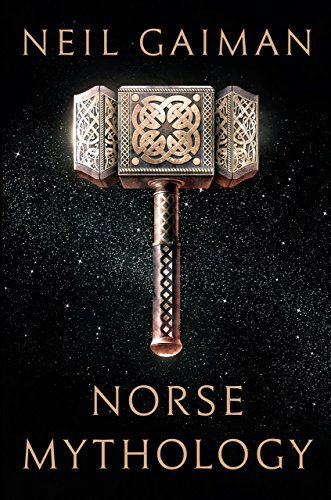 Finally, the book I have been waiting on for months now is finally out and I read the whole thing in a sitting. I am speaking, of course, of Neil Gaiman’s Norse Mythology. I don’t know that I can say enough good things about this collection. It is the rare book that I can call flawless; something that I finished and wanted to read again. It is not a “Neil Gaiman book” in the traditional sense, he has tapped into an entirely different narrative voice. It addresses you as easily as some weird old one-eyed man chatting you up at a seedy pub somewhere and asking you if you’d like to hear some stories about gods long dead.
Finally, the book I have been waiting on for months now is finally out and I read the whole thing in a sitting. I am speaking, of course, of Neil Gaiman’s Norse Mythology. I don’t know that I can say enough good things about this collection. It is the rare book that I can call flawless; something that I finished and wanted to read again. It is not a “Neil Gaiman book” in the traditional sense, he has tapped into an entirely different narrative voice. It addresses you as easily as some weird old one-eyed man chatting you up at a seedy pub somewhere and asking you if you’d like to hear some stories about gods long dead.
Now, I’m a giant, nitpicky mythology nerd and the Norse pantheon is about tied with the Greek one for me when it comes to myths I cut my teeth on, so I went in with a very high bar and was surprised to find it cleared with so much seeming ease. I’d honestly call it the defining take on all of these stories, having read many, many translations of each before now.
If you’re a Gaiman fan, you’ll be happy to know that in spite of this radically different narrative voice, it does feel like it slots neatly into other works of his. The Odin talked about here absolutely does show up in American Gods, in all his glory. The Asgardian squad who make their appearance in The Sandman step directly out of these pages. It’s the same Thor, the same Loki. It’s not the Marvel-ized versions of anything, even though Gaiman does acknowledge that he only ever got into these myths after devouring the old Mighty Thor comics as a boy.
Advertisements Share this: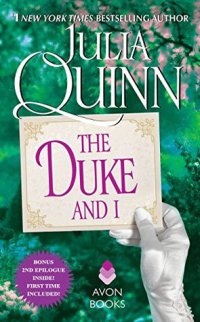

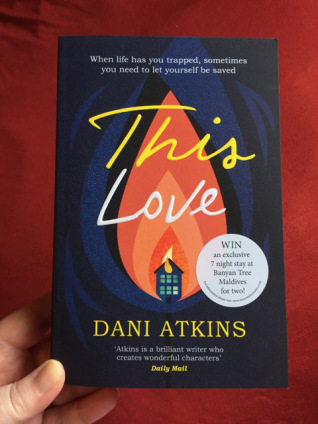
![Loving Day: A Novel by [Johnson, Mat]](/ai/067/426/67426.jpg)
